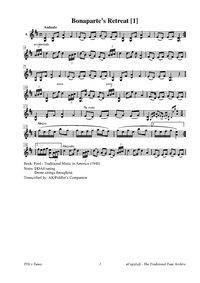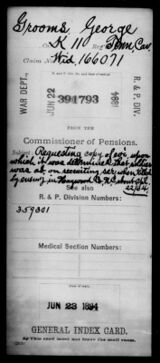Template:Pagina principale/Vetrina: Difference between revisions
No edit summary |
No edit summary |
||
| (156 intermediate revisions by the same user not shown) | |||
| Line 1: | Line 1: | ||
{{SheetMusic | {{SheetMusic | ||
|f_track= | |f_track=GroomsTune.mp3 | ||
|f_pdf= | |f_pdf=Bonaparte Retreat.pdf | ||
|f_artwork= | |f_artwork=GroomsPension.jpg | ||
|f_tune_name= | |f_tune_name=Bonaparte's Retreat | ||
|f_track_title= | |f_track_title=Bonaparte's Retreat_(1) | ||
|f_section=abc | |f_section=abc | ||
|f_played_by=[https://soundcloud.com/ | |f_played_by=[https://soundcloud.com/dollyparton Dolly Parton] | ||
|f_notes= | |f_notes=To this day, North Carolina mountain fiddlers will refer to Bonaparte's Retreat as "Grooms' Tune". | ||
|f_caption=The | |f_caption=The last card in his file is from 1893. His widow was probably years obtaining a widow's pension. She had to have "deserted" cleared from his record. A notation on that last card says :{{break|2}} | ||
|f_source=[https://soundcloud.com/ | "''The charge of desertion against this man has been removed. It has been determined from evidence presented, that he was killed by the enemy, April 22, 1864, while absent on recruiting service in Haywood County, NC''". | ||
|f_source=[https://soundcloud.com/dollyparton/grooms-tune-bonapartes-retreat Soundcloud] | |||
|f_pix=420 | |f_pix=420 | ||
|f_picpix=200 | |f_picpix=200 | ||
|f_article=[[ | |f_article=[[Bonaparte's Retreat_(1) | '''Bonaparte's Retreat''']] | ||
''' | |||
According to Blue Ridge Mountain local history the tune was known in the Civil War era. Geoffrey Cantrell, writing in the '''Asheville Citizen-Times''' of Feb., 23, 2000 relates the story of the execution of three men by the Confederate Home Guard on April 10th, 1865, the day after Lee's surrender at Appomattox Courthouse. | |||
That news would not have been known to them, given the difficulty with communications at that time. It is documented that Henry Grooms, his brother George and his brother-in-law Mitchell Caldwell, all of north Haywood County, North Carolina, were taken prisoner by the Guard under the command of one Captain Albert Teague-no one knows why, but the area had been ravaged by scalawags and bushwackers, and the populace had suffered numerous raids of family farms by Union troops hunting provisions. | |||
One theory is that the men were accused of being Confederate deserters who, perhaps knowing the war was nearly over, had aided the Union cause in some way. There was much back-and-forth guerilla warfare, however, and the village of Waynesville had been burned two months earlier (by Unionists), and the citizenry was beleaguered and anxious. Caldwell and the Grooms brothers were captured in the Big Creek section of Haywood County, close to the Tennessee border. | |||
'' | Cantrell writes: "The group traveled toward Cataloochee Valley and Henry Grooms, clutching his fiddle and bow, was asked by his captors to play a tune. Realizing he was performing for his own firing squad Grooms struck up Bonaparte's Retreat," his favorite tune. | ||
When he finished the three men were lined up against an oak tree and shot, the bodies left where they fell. Henry's wife gathered the bodies and buried them in a single grave in the family plot at Sutton Cemetery No. 1 in the Mount Sterling community, the plain headstone reading only "Murdered." | |||
The original source for the story is George A. Miller, in his book '''Cemeteries and Family Graveyards in Haywood County, N.C.''' | |||
}} | }} | ||
Latest revision as of 19:03, 12 January 2025

"The charge of desertion against this man has been removed. It has been determined from evidence presented, that he was killed by the enemy, April 22, 1864, while absent on recruiting service in Haywood County, NC".
Played by: Dolly Parton
Source: Soundcloud
Image: To this day, North Carolina mountain fiddlers will refer to Bonaparte's Retreat as "Grooms' Tune".

According to Blue Ridge Mountain local history the tune was known in the Civil War era. Geoffrey Cantrell, writing in the Asheville Citizen-Times of Feb., 23, 2000 relates the story of the execution of three men by the Confederate Home Guard on April 10th, 1865, the day after Lee's surrender at Appomattox Courthouse.
That news would not have been known to them, given the difficulty with communications at that time. It is documented that Henry Grooms, his brother George and his brother-in-law Mitchell Caldwell, all of north Haywood County, North Carolina, were taken prisoner by the Guard under the command of one Captain Albert Teague-no one knows why, but the area had been ravaged by scalawags and bushwackers, and the populace had suffered numerous raids of family farms by Union troops hunting provisions.
One theory is that the men were accused of being Confederate deserters who, perhaps knowing the war was nearly over, had aided the Union cause in some way. There was much back-and-forth guerilla warfare, however, and the village of Waynesville had been burned two months earlier (by Unionists), and the citizenry was beleaguered and anxious. Caldwell and the Grooms brothers were captured in the Big Creek section of Haywood County, close to the Tennessee border.
Cantrell writes: "The group traveled toward Cataloochee Valley and Henry Grooms, clutching his fiddle and bow, was asked by his captors to play a tune. Realizing he was performing for his own firing squad Grooms struck up Bonaparte's Retreat," his favorite tune.
When he finished the three men were lined up against an oak tree and shot, the bodies left where they fell. Henry's wife gathered the bodies and buried them in a single grave in the family plot at Sutton Cemetery No. 1 in the Mount Sterling community, the plain headstone reading only "Murdered."
The original source for the story is George A. Miller, in his book Cemeteries and Family Graveyards in Haywood County, N.C.
...more at: Bonaparte's Retreat - full Score(s) and Annotations
X:1 T:Bonaparte's Retreat [1] M:C L:1/8 Q:"Andante" N:DDAd tuning N:Drone strings throughout. B:Ford - Traditional Music in America (1940) Z:AK/Fiddler's Companion K:D % V:1 clef=treble name="0." [V:1] [G,2D2] [G,D]F [D2A2]F2|(ED) (EF) (GF) (EF)|[G,2D2][G,D]F [D2A2]F2|(ED) (EF) [G,3D3]:| "accelerando"(3A/B/c/|d2 d>f d2 (3A/B/c/|(dB) (AG) (FD) (3A/B/c/|d2 d>f d[D2A2]|(FD) (EF) (GF) (EF)| [G,D][G,D]F [D2A2]F2|(ED) (EF) (GF) (EF)|[G,2D2][G,D]F [D2A2]F2|(ED) (EF) [G,3D3]z2|| (3A/B/c/|[G,2D2]d>"poco"f d2 (3A/B/c/|[G,D]>B (AG) (FD) "poco"(3A/B/c/|[G,2D2]|d>f d2A2|(F>D) (EF) (GF) (EF)| [G,2D2][GD]F [D2A2]F2|"Piu moto"(ED) (EF) (GF) (EF)|[G,2D2] {G,D]F [D2A2]F2|(ED) (EF) [G,4D4]|"Coda"[A8e8]|| M:2/4 L:1/8 "Allegro"(g/e/g/e/ bg|g/e/f/g/ a/g/f)|(g/e/g/e/ bg|1 f/e/f/g/ [A2e2]):| |2f/e/f/g/ [Ae](3A/B/c/||"Allegretto"d2 d>f d2 (3A/B/c/|(dB) (AG) (FD) (3A/B/c/|d2 d>f d2A2|(FD) (EF) (GF) (EF)|
